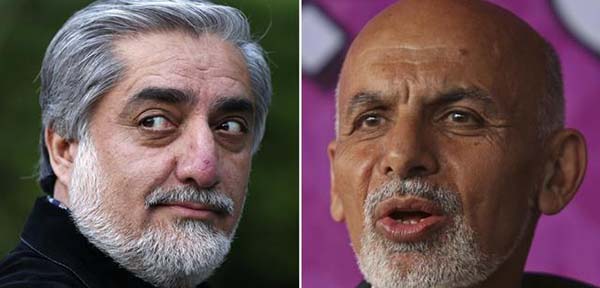KABUL - Some people consider the agreement between the presidential hopefuls on a unity government in the national interest, but others think a coalition government would benefit specific groups only.
With the government’s power structure unclear, Ashraf Ghani Ahmadzai and Abdullah Abdullah singed on Friday a deal ending their disagreements over the June 14 runoff election after talks with US Secretary of State John Kerry.
The squabbling candidates agreed to form a national unity government after the ongoing ballot audit had finished.
A former World Bank economist, Ahmadzai said he and Abdullah, whom he called a "brother," were ready to end the vicious circle of turmoil in Afghanistan and that they understood the need to work together for the people’s prosperity.
Ex-foreign minister Abdullah told reporters the sides had inked the accord in the interest of national unity and a better future for the people. He insisted they had resolved their differences to stabilise the country and measure up to popular aspirations.
Kerry, who held two rounds of talks with Abdullah and Ahmadzai and paid a courtesy call on President Hamid Karzai, hailed the agreement as giant stride toward averting possible political chaos.
Many residents interviewed by Pajhwok Afghan News about the agreement expressed mixed reactions.
Rahmatullah Alimyar, a resident of the central capital Kabul, said: “I hope the agreement on a unity government will bear positive results because every Afghan wants to live in peace and have a successful life.”
Izzatullah, a shopkeeper, said he believed that only unity could help steer the Afghans out of the prevailing situation. He said the nation could easily plunge into a new civil war if they ignored the concept of unity.
But Mohammad Hussain, a labourer, awaiting someone to hire his services in Thaimani neighbourhood, said if the candidates and their team members were good people, they should not create problems for the nation and each other and instead face together the challenges at hand.
“How long shall we rely on US aid? We have a sovereign country, we cast votes and the candidates should respect each other,” he urged.
Having a family of eight, Hussain said: “We don’t want war, I am happy with poverty not with the war.”
Nisar Ahmad, a resident of southern Kandahar province, said the prolonged election process by hurting people’s lives and their economy strengthened insurgency across the country.
He said: “It’s good to hear that the candidates had agreed on forming a government of national unity to save the country from new crisis.”
But a shopkeeper in Kandahar City, Mohammad Nabi, said the deal between Ghani and Abdullah discredited the elections and widened divisions among the masses on ethnic lines. “People did not expect this to happen.”
He assailed both the presidential candidates for keeping supreme their own interests over national interest and making the electoral process to lose its value.
Another Kandahar resident, Mir Ahmad Joyenda, believed unity government would mean the repetition the decade-old system and the candidates would be unable to execute the plans through which they lured voters.
“People have bad memories of the coalition and unity governments because such regimes only benefited certain groups and did nothing beneficial to the people,” he argued.
Syed Khan from Chahar Bolak district of northern Balkh province said the deal was based on personal interests of the two candidates. He said the candidates should have reached such an agreement before the polls if they had to form a government of national unity.
A resident of Mazar-i-Sharif, the provincial capital, Mohammad Noman, said the deal might solve the current problems, but seriously damaged democracy in Afghanistan.
The electoral tension and disputes between the two candidates have questioned the credibility of the Independent Election Commission (IEC) and narrowed the trust of Afghans in transparent elections, he opined.
But another dweller Mohammad Sharif said the agreement was needed keeping in mind the so many problems facing Afghanistan.
“If both the candidates are ready to form a unity government, it may possibly pull the country out of the current crises,” he said.
A student at Balkh University, Javed, said a coalition government required the president to be a good manager. “If the next president can better manage the country, it will help solve serious problems the nation has been in over the past 13 years,” he added.
But a civil society activist in northern Kunduz province, Hashmatullah, said national unity government meant sharing power, a system he said America wanted to impose on both the candidates.
“People are not satisfied with the Karzai government because it has not been independent and influenced by everyone and the next government seems to be of the same kind,” he said.
He stressed the next government should first eradicate discrimination against certain Afghan communities. He warned people would revolt against the national unity government if it failed to bring peace and protect the national interest.
A university student in central Bamyan province said the two candidates lacked the spirit of agreement and pushed the country into crisis. “And that’s why foreigners have to come and solve our problems.”
“This agreement thanks to John Kerry shows how much weak the two candidates are,” he said. (Pajhwok)

